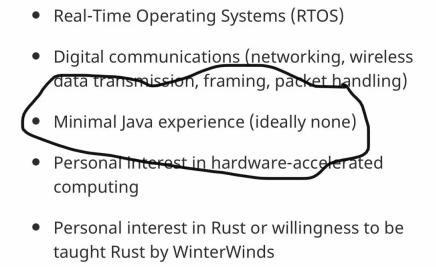YAML is good for files that have a very flexible structure or need to define a series of steps. Like github workflows or docker-compose files. For traditional config files with a more or less fixed structure, TOML is better I think
- 6 Posts
- 31 Comments
Please don’t. If you need something like json but with comments, then use YAML or TOML. Those formats are designed to be human-readable by default, json is better suited for interchanging information between different pieces of software. And if you really need comments inside JSON, then find a parser that supports
//or/* */syntax.
Never knew that ddg had an LLM, will check it out. Thanks!
I’m sorry which LLM is this?
It’s perplexity.ai. I like it because it doesn’t require an account and because it can search the internet. It’s like microsoft’s bing but slightly less cringe.
How’d you get that out of it?
The screenshot is fake. I used Inspect Element.

 0·4 months ago
0·4 months agoStill better than automatically converting :) to 😃

 1·4 months ago
1·4 months agoFor a while I had a low-power server for my personal things that stayed on all the time, and a more powerful computer that hosted a minecraft server. As the player count dwindled, I decided to make the minecraft server automatically shut down at midnight, and wake up at 8 in the morning using
rtcwake. And eventually I disabled the rtcwake thing entirely, and made the smaller server run a webui that could wake up the minecraft server using wake-on-lan. So if anyone wanted to play, they would first have to remotely turn on the server through a web page. This was all password-protected ofcourse.Also, no, I don’t use a UPS. I’ve never seen anyone use a UPS in the country where I live, and I don’t think I’ve experienced a power outtage in like 4 years. Whether or not you need a UPS seems to be largely dependent on where you live.
He’s recording the extracted data into a MongoDB database, yes!
Jokes aside, LLMs are actually pretty nice, since they lower the barrier to entry for programming. A guy I know has been doing all of his data processing with obscure Excel hacks his entire life. But recently he had to parse a file with like a million or so lines, which would take forever in excel, so now he’s hacking together a python script using ChatGPT and meta ai. And in the process, he’s actually picking up a bit of python knowledge himself. He now knows what lists are, how loops and if statements work, and he even understands “intermediate” features like list comprehension and regex. They said llms would replace programmers, but in reality they’re making more of us lol

This but with “microsoft office” instead of java

 0·6 months ago
0·6 months agoGradual typing isn’t reinventing the wheel, it’s a new paradigm. Statically typed code is easier to write and harder to debug. Dynamically typed code is harder to debug, but easier to write. With gradual typing, the idea is that you can first write dynamic code (easier to write), and then – wait for it – GRADUALLY turn it into static code by adding type hints (easier to debug). It separates the typing away from the writing, meaning that the programmer doesn’t have to multitask as much. If you know what you’re doing, mypy really does let you eat your cake and keep it too.

 1·8 months ago
1·8 months agou/vox@sopuli.xyz suggested Typst as an alternative to TeX. I gave it a try, and I’m loving it so far. It even has built-in support for the rotated text thing https://typst.app/docs/reference/model/table . I’ve only used it for notes/homework so far, but I’m looking forward to seeing how it fares for more serious typesetting tasks.

 2·8 months ago
2·8 months agotries to install R packages by first looking in bioconductor and then trying the rejects through conda-forge, and then the rejects from that are compiled from source
Just do all of these in parallel to maximise the change of installing the correct version

 1·8 months ago
1·8 months agoit sounds almost poetic

 3·8 months ago
3·8 months agoTesting 123
$$ \sigma $$
aww…

 2·8 months ago
2·8 months agoSo there are many different commands that compile LaTeX, right?
pdflatex,pdftex,latexmk, etc. But they all do that thing where they ask for your input as soon as they encounter an error, right? Well, if you just pipe an emptyechocommand to them, it notices thatstdinhas reached end-of-file, and gives up trying to ask the user for input, and just exits on first error. So instead ofpdflatex mydocument.tex, you can doecho | pdflatex mydocument.texand it won’t ask you for input if it sees an error, it’ll just exit. There’s probably a “proper” way to achieve the same behaviour, but I can’t be arsed to read the docs.Speaking of stupid TeX hacks, at one point I had a script called
latex_compile_and_install_packages_until_it_works.sh. It’s essentially a loop that repeatedly tries to compile a document, searches the output of the compiler for anything that looks like a missing package error, and pipes it tosudo tlmgr install. The “fuck it” of package management, arbitrary code execution exploit included!
(Sorry for the screenshot, I lost the original script in text form, probably for the better)

 2·8 months ago
2·8 months agoYeah, what the hell is up with that? I always just
echo | pdflatexto make it shut up and exit on error. Maybe one day I’ll learn how to actually use that interactive compilation thing, but not today lol.

A lot of “hardware raid” is just a separate controller doing software raid. I thought I lost access to a bunch of data when my raid controller died, before I realized that I could just plug the disks directly into the computer and mount them with mdadm. But yes, hardware raid seems a bit pointless nowadays.